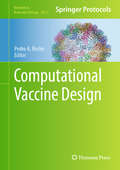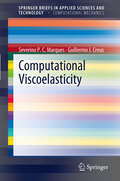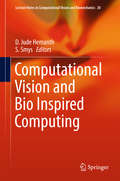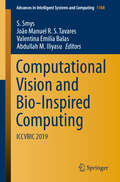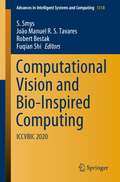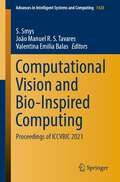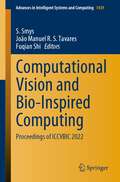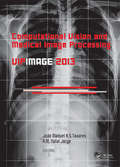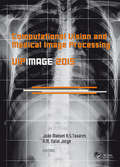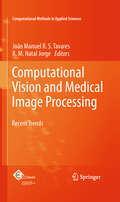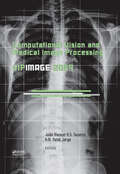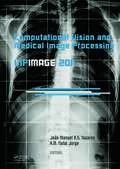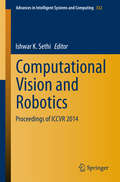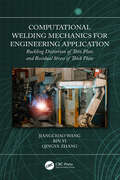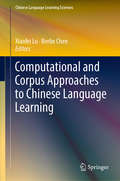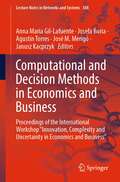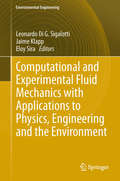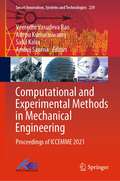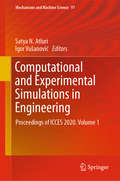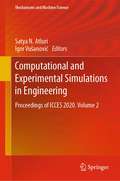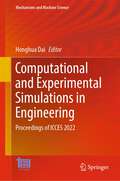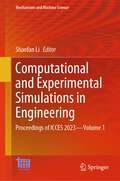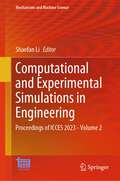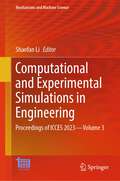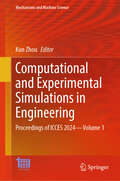- Table View
- List View
Computational Vaccine Design (Methods in Molecular Biology #2673)
by Pedro A. RecheThis volume explores computational vaccine design and the technologies that support it. Chapters have been divided into four parts detailing immunonics and system immunology, databases, prediction of antigenicity and immunogenicity, and computational vaccinology. Written in the format of the highly successful Methods in Molecular Biology series, each chapter includes an introduction to the topic, lists necessary materials and reagents, includes tips on troubleshooting and known pitfalls, and step-by-step, readily reproducible protocols. Authoritative and cutting-edge, Computational Vaccine Design: Methods and Protocols aims to reflect on the rigorous and imaginative use of computational technologies to help catalyze future efforts and to improve global public health through the development of a broad range of novel vaccines.
Computational Viscoelasticity (SpringerBriefs in Applied Sciences and Technology)
by Severino P. Marques Guillermo J. CreusThis text is a guide how to solve problems in which viscoelasticity is present using existing commercial computational codes. The book gives information on codes' structure and use, data preparation and output interpretation and verification. The first part of the book introduces the reader to the subject, and to provide the models, equations and notation to be used in the computational applications. The second part shows the most important Computational techniques: Finite elements formulation, Boundary elements formulation, and presents the solutions of Viscoelastic problems with Abaqus.
Computational Vision and Bio Inspired Computing
by D. Jude Hemanth S. SmysThis is the proceedings of the International Conference On Computational Vision and Bio Inspired Computing (ICCVBIC 2017) held at RVS Technical Campus, September 21-22, 2017. It includes papers on state of the art innovations in bio-inspired computing applications, where new algorithms and results are produced and described. Additionally, this volume addresses evolutionary computation paradigms, artificial neural networks and biocomputing. It focuses mainly on research based on visual interference on the basis of biological images. Computation of data sources also plays a major role in routine day-to-day life for the purposes such as video transmission, wireless applications, fingerprint recognition and processing, big data intelligence, automation, human centric recognition systems. With the advantage of processing bio-inspired computations, a variety of computational paradigms can be processed. Finally, this book also treats the formation of neural networks by enabling local connectivity within it with the aid of vision sensing elements. The work also provides potential directions for future research.
Computational Vision and Bio-Inspired Computing: ICCVBIC 2019 (Advances in Intelligent Systems and Computing #1108)
by João Manuel R. S. Tavares Valentina Emilia Balas S. Smys Abdullah M. IliyasuThis proceedings book presents state-of-the-art research innovations in computational vision and bio-inspired techniques. Due to the rapid advances in the emerging information, communication and computing technologies, the Internet of Things, cloud and edge computing, and artificial intelligence play a significant role in the computational vision context. In recent years, computational vision has contributed to enhancing the methods of controlling the operations in biological systems, like ant colony optimization, neural networks, and immune systems. Moreover, the ability of computational vision to process a large number of data streams by implementing new computing paradigms has been demonstrated in numerous studies incorporating computational techniques in the emerging bio-inspired models. The book reveals the theoretical and practical aspects of bio-inspired computing techniques, like machine learning, sensor-based models, evolutionary optimization, and big data modeling and management, that make use of effectual computing processes in the bio-inspired systems. As such it contributes to the novel research that focuses on developing bio-inspired computing solutions for various domains, such as human–computer interaction, image processing, sensor-based single processing, recommender systems, and facial recognition, which play an indispensable part in smart agriculture, smart city, biomedical and business intelligence applications.
Computational Vision and Bio-Inspired Computing: ICCVBIC 2020 (Advances in Intelligent Systems and Computing #1318)
by João Manuel R. S. Tavares S. Smys Robert Bestak Fuqian ShiThis book includes selected papers from the 4th International Conference on Computational Vision and Bio Inspired Computing (ICCVBIC 2020), held in Coimbatore, India, from November 19 to 20, 2020. This proceedings book presents state-of-the-art research innovations in computational vision and bio-inspired techniques. The book reveals the theoretical and practical aspects of bio-inspired computing techniques, like machine learning, sensor-based models, evolutionary optimization and big data modeling and management that make use of effectual computing processes in the bio-inspired systems. As such it contributes to the novel research that focuses on developing bio-inspired computing solutions for various domains, such as human–computer interaction, image processing, sensor-based single processing, recommender systems and facial recognition, which play an indispensable part in smart agriculture, smart city, biomedical and business intelligence applications.
Computational Vision and Bio-Inspired Computing: Proceedings of ICCVBIC 2021 (Advances in Intelligent Systems and Computing #1420)
by João Manuel R. S. Tavares Valentina Emilia Balas S. SmysThis book includes selected papers from the 5th International Conference on Computational Vision and Bio Inspired Computing (ICCVBIC 2021), held in Coimbatore, India, during November 25–26, 2021. This book presents state-of-the-art research innovations in computational vision and bio-inspired techniques. The book reveals the theoretical and practical aspects of bio-inspired computing techniques, like machine learning, sensor-based models, evolutionary optimization and big data modeling and management that make use of effectual computing processes in the bio-inspired systems. It also contributes to the novel research that focuses on developing bio-inspired computing solutions for various domains, such as human–computer interaction, image processing, sensor-based single processing, recommender systems and facial recognition, which play an indispensable part in smart agriculture, smart city, biomedical and business intelligence applications.
Computational Vision and Bio-Inspired Computing: Proceedings of ICCVBIC 2022 (Advances in Intelligent Systems and Computing #1439)
by João Manuel R. S. Tavares S. Smys Fuqian ShiThis book includes selected papers from the 6th International Conference on Computational Vision and Bio Inspired Computing (ICCVBIC 2022), held in Coimbatore, India, from November 18 to 19, 2022. This volume presents state-of-the-art research innovations in computational vision and bio-inspired techniques. It includes theoretical and practical aspects of bio-inspired computing techniques, like machine learning, sensor-based models, evolutionary optimization and big data modeling and management that make use of effectual computing processes in the bio-inspired systems.
Computational Vision and Medical Image Processing IV: VIPIMAGE 2013
by João Manuel R.S. Tavares R.M. Natal JorgeComputational Vision and Medical Image Processing. VIPIMAGE 2013 contains invited lectures and full papers presented at VIPIMAGE 2013 - IV ECCOMAS Thematic Conference on Computational Vision and Medical Image Processing (Funchal, Madeira Island, Portugal, 14-16 October 2013). International contributions from 16 countries provide a comprehensive cov
Computational Vision and Medical Image Processing V: Proceedings of the 5th Eccomas Thematic Conference on Computational Vision and Medical Image Processing (VipIMAGE 2015, Tenerife, Spain, October 19-21, 2015)
by João Manuel R.S. Tavares R.M. Natal JorgeVipIMAGE 2015 contains invited lectures and full papers presented at VIPIMAGE 2015 - V ECCOMAS Thematic Conference on Computational Vision and Medical Image Processing (Tenerife, Canary Islands, Spain, 19-21 October, 2015). International contributions from 19 countries provide a comprehensive coverage of the current state-of-the-art in the fields o
Computational Vision and Medical Image Processing: Recent Trends (Computational Methods in Applied Sciences #19)
by Joao Tavares R. M. JorgeThis book contains extended versions of papers presented at the international Conference VIPIMAGE 2009 - ECCOMAS Thematic Conference on Computational Vision and Medical Image, that was held at Faculdade de Engenharia da Universidade do Porto, Portugal, from 14th to 16th of October 2009. This conference was the second ECCOMAS thematic conference on computational vision and medical image processing. It covered topics related to image processing and analysis, medical imaging and computational modelling and simulation, considering their multidisciplinary nature. The book collects the state-of-the-art research, methods and new trends on the subject of computational vision and medical image processing contributing to the development of these knowledge areas.
Computational Vision and Medical Image Processing: VipIMAGE 2009
by João Manuel R.S. Tavares & R.M. Natal JorgeComputational Vision and Medical Image Processing, VIPIMAGE 2009 contains the full papers presented at VIPIMAGE 2009 - Second ECCOMAS Thematic Conference on Computational Vision and Medical Image Processing, held in Porto, Portugal, on 14-16 October 2009. International contributions from twenty countries provide a comprehensive coverage of the curr
Computational Vision and Medical Image Processing: VipIMAGE 2011
by João Manuel R.S. Tavares R.M. Natal JorgeThis book contains invited lecturers and full papers presented at VIPIMAGE 2011 - III ECCOMAS Thematic Conference on Computational Vision and Medical Image Processing (Olh Algarve, Portugal, 12-14 October 2011). International contributions from 16 countries provide a comprehensive coverage of the current state-of-the-art in: Image Processing
Computational Vision and Robotics: Proceedings of ICCVR 2014 (Advances in Intelligent Systems and Computing #332)
by Ishwar K. SethiComputer Vision and Robotic is one of the most challenging areas of 21st century. Its application ranges from Agriculture to Medicine, Household applications to Humanoid, Deep-sea-application to Space application, and Industry applications to Man-less-plant. Today's technologies demand to produce intelligent machine, which are enabling applications in various domains and services. Robotics is one such area which encompasses number of technology in it and its application is widespread. Computational vision or Machine vision is one of the most challenging tools for the robot to make it intelligent. This volume covers chapters from various areas of Computational Vision such as Image and Video Coding and Analysis, Image Watermarking, Noise Reduction and Cancellation, Block Matching and Motion Estimation, Tracking of Deformable Object using Steerable Pyramid Wavelet Transformation, Medical Image Fusion, CT and MRI Image Fusion based on Stationary Wavelet Transform. The book also covers articles from applications of soft computing techniques such as Target Searching and Tracking using Particle Swarm Optimization, PSO-based Functional Artificial Neural Network, etc. The book also covers article from the areas of Robotics such as Solar Power Robot Vehicle, Multi Robot Area Exploration, Intelligent Driving System based on Video Sequencing, Emotion Recognition using MLP Network, Identifying the Unstructured Environment.
Computational Welding Mechanics for Engineering Application: Buckling Distortion of Thin Plate and Residual Stress of Thick Plate
by Jiangchao Wang Bin Yi Qingya ZhangComputational Welding Mechanics for Engineering Application: Buckling Distortion of Thin Plate and Residual Stress of Thick Plate deals with two special issues in the field of computational welding mechanics: buckling distortion of thin plate and residual stress of thick plate. Through experiment, theory, and computational analysis, the authors systematically introduce the latest progress and achievements of computational welding mechanics, such as weld buckling in lightweight fabrication and residual stress in HTSS thick plate welding. In addition, they also explore its application to address real-world engineering problems in advanced manufacturing, such as precision manufacturing and mechanical performance evaluation. The book will be of interest to scholars and engineers of computational welding mechanics who wish to represent the welding mechanics response, predict the distribution and magnitude of mechanical variables, or optimize the welding technique to improve the manufacturing quality.
Computational and Corpus Approaches to Chinese Language Learning (Chinese Language Learning Sciences)
by Xiaofei Lu Berlin ChenThis book presents a collection of original research articles that showcase the state of the art of research in corpus and computational linguistic approaches to Chinese language teaching, learning and assessment. It offers a comprehensive set of corpus resources and natural language processing tools that are useful for teaching, learning and assessing Chinese as a second or foreign language; methods for implementing such resources and techniques in Chinese pedagogy and assessment; as well as research findings on the effectiveness of using such resources and techniques in various aspects of Chinese pedagogy and assessment.
Computational and Decision Methods in Economics and Business: Proceedings of the International Workshop “Innovation, Complexity and Uncertainty in Economics and Business” (Lecture Notes in Networks and Systems #388)
by Anna Maria Gil-Lafuente Janusz Kacprzyk José M. Merigó Josefa Boria Agustín TorresThis book presents different topics related to innovation, complexity, uncertainty, modeling and simulation, fuzzy logic, decision-making, aggregation operators, business and economic applications, among others. The chapters are the results of research presented at the International Workshop "Innovation, Complexity and Uncertainty in Economics and Business", held in Barcelona, in November 2019, by The Ibero-American Network for Competitiveness, Innovation and Development (REDCID in Spanish) and the Royal Academy of Economic and Financial Sciences (RACEF in Spanish). These papers are useful for junior and senior researchers in the area of economics and business.
Computational and Experimental Fluid Mechanics with Applications to Physics, Engineering and the Environment (Environmental Science and Engineering)
by Leonardo Di G. Sigalotti Jaime Klapp Eloy SiraThe book presents a collection of selected papers from the I Workshop of the Venezuelan Society of Fluid Mechanics held on Margarita Island, Venezuela from November 4 to 9, 2012. Written by experts in their respective fields, the contributions are organized into five parts: - Part I Invited Lectures, consisting of full-length technical papers on both computational and experimental fluid mechanics covering a wide range of topics from drops to multiphase and granular flows to astrophysical flows, - Part II Drops, Particles and Waves - Part III Multiphase and Multicomponent Flows - Part IV Atmospheric and Granular Flows - and Part V Turbulent and Astrophysical Flows. The book is intended for upper-level undergraduate and graduate students as well as for physicists, chemists and engineers teaching and working in the field of fluid mechanics and its applications. The contributions are the result of recent advances in theoretical and experimental research in fluid mechanics, encompassing both fundamentals as well as applications to fluid engineering design, including pipelines, turbines, flow separators, hydraulic systems and biological fluid elements, and to granular, environmental and astrophysical flows.
Computational and Experimental Methods in Mechanical Engineering: Proceedings of ICCEMME 2021 (Smart Innovation, Systems and Technologies #239)
by Veeredhi Vasudeva Rao Adepu Kumaraswamy Sahil Kalra Ambuj SaxenaThis book includes selected peer-reviewed papers presented at third International Conference on Computational and Experimental Methods in Mechanical Engineering held in June 2021 at G.L. Bajaj Institute of Technology and Management, Greater Noida, U.P, India. The book covers broad range of topics in latest research including hydropower, heat transfer, fluid mechanics, advanced manufacturing, recycling and waste disposal, solar energy, thermal power plants, refrigeration and air conditioning, robotics, automation and mechatronics, and advanced designs. The authors are experienced and experts in their field, and all papers are reviewed by expert reviewers in respective field. The book is useful for industry peoples, faculties, and research scholars.
Computational and Experimental Simulations in Engineering: Proceedings of ICCES 2020. Volume 1 (Mechanisms and Machine Science #97)
by Satya N. Atluri Igor VušanovićThis book gathers the latest advances, innovations, and applications in the field of computational engineering, as presented by leading international researchers and engineers at the 26th International Conference on Computational & Experimental Engineering and Sciences (ICCES), held in Phuket, Thailand on January 6-10, 2021. ICCES covers all aspects of applied sciences and engineering: theoretical, analytical, computational, and experimental studies and solutions of problems in the physical, chemical, biological, mechanical, electrical, and mathematical sciences. As such, the book discusses highly diverse topics, including composites; bioengineering & biomechanics; geotechnical engineering; offshore & arctic engineering; multi-scale & multi-physics fluid engineering; structural integrity & longevity; materials design & simulation; and computer modeling methods in engineering. The contributions, which were selected by means of a rigorous international peer-review process, highlight numerous exciting ideas that will spur novel research directions and foster multidisciplinary collaborations.
Computational and Experimental Simulations in Engineering: Proceedings of ICCES 2020. Volume 2 (Mechanisms and Machine Science #98)
by Satya N. Atluri Igor VušanovićThis book gathers the latest advances, innovations, and applications in the field of computational engineering, as presented by leading international researchers and engineers at the 26th International Conference on Computational & Experimental Engineering and Sciences (ICCES), held in Phuket, Thailand on January 6-10, 2021. ICCES covers all aspects of applied sciences and engineering: theoretical, analytical, computational, and experimental studies and solutions of problems in the physical, chemical, biological, mechanical, electrical, and mathematical sciences. As such, the book discusses highly diverse topics, including composites; bioengineering & biomechanics; geotechnical engineering; offshore & arctic engineering; multi-scale & multi-physics fluid engineering; structural integrity & longevity; materials design & simulation; and computer modeling methods in engineering. The contributions, which were selected by means of a rigorous international peer-review process, highlight numerous exciting ideas that will spur novel research directions and foster multidisciplinary collaborations.
Computational and Experimental Simulations in Engineering: Proceedings of ICCES 2022 (Mechanisms and Machine Science #119)
by Honghua DaiThis book gathers the latest advances, innovations, and applications in the field of computational engineering, as presented by leading international researchers and engineers at the 27th International Conference on Computational & Experimental Engineering and Sciences (ICCES), held online on January 8-12, 2022. ICCES covers all aspects of applied sciences and engineering: theoretical, analytical, computational, and experimental studies and solutions of problems in the physical, chemical, biological, mechanical, electrical, and mathematical sciences. As such, the book discusses highly diverse topics, including composites; bioengineering & biomechanics; geotechnical engineering; offshore & arctic engineering; multi-scale & multi-physics fluid engineering; structural integrity & longevity; materials design & simulation; and computer modeling methods in engineering. The contributions, which were selected by means of a rigorous international peer-review process, highlight numerous exciting ideas that will spur novel research directions and foster multidisciplinary collaborations.
Computational and Experimental Simulations in Engineering: Proceedings of ICCES 2023—Volume 1 (Mechanisms and Machine Science #143)
by Shaofan LiThis book gathers the latest advances, innovations, and applications in the field of computational engineering, as presented by leading international researchers and engineers at the 29th International Conference on Computational & Experimental Engineering and Sciences (ICCES), held in Shenzhen, China on May 26-29, 2023. ICCES covers all aspects of applied sciences and engineering: theoretical, analytical, computational, and experimental studies and solutions of problems in the physical, chemical, biological, mechanical, electrical, and mathematical sciences. As such, the book discusses highly diverse topics, including composites; bioengineering & biomechanics; geotechnical engineering; offshore & arctic engineering; multi-scale & multi-physics fluid engineering; structural integrity & longevity; materials design & simulation; and computer modeling methods in engineering. The contributions, which were selected by means of a rigorous international peer-review process, highlight numerous exciting ideas that will spur novel research directions and foster multidisciplinary collaborations.
Computational and Experimental Simulations in Engineering: Proceedings of ICCES 2023—Volume 2 (Mechanisms and Machine Science #145)
by Shaofan LiThis book gathers the latest advances, innovations, and applications in the field of computational engineering, as presented by leading international researchers and engineers at the 29th International Conference on Computational & Experimental Engineering and Sciences (ICCES), held in Shenzhen, China on May 26-29, 2023. ICCES covers all aspects of applied sciences and engineering: theoretical, analytical, computational, and experimental studies and solutions of problems in the physical, chemical, biological, mechanical, electrical, and mathematical sciences. As such, the book discusses highly diverse topics, including composites; bioengineering & biomechanics; geotechnical engineering; offshore & arctic engineering; multi-scale & multi-physics fluid engineering; structural integrity & longevity; materials design & simulation; and computer modeling methods in engineering. The contributions, which were selected by means of a rigorous international peer-review process, highlight numerous exciting ideas that will spur novel research directions and foster multidisciplinary collaborations.
Computational and Experimental Simulations in Engineering: Proceedings of ICCES 2023—Volume 3 (Mechanisms and Machine Science #146)
by Shaofan LiThis book gathers the latest advances, innovations, and applications in the field of computational engineering, as presented by leading international researchers and engineers at the 29th International Conference on Computational & Experimental Engineering and Sciences (ICCES), held in Shenzhen, China on May 26-29, 2023. ICCES covers all aspects of applied sciences and engineering: theoretical, analytical, computational, and experimental studies and solutions of problems in the physical, chemical, biological, mechanical, electrical, and mathematical sciences. As such, the book discusses highly diverse topics, including composites; bioengineering & biomechanics; geotechnical engineering; offshore & arctic engineering; multi-scale & multi-physics fluid engineering; structural integrity & longevity; materials design & simulation; and computer modeling methods in engineering. The contributions, which were selected by means of a rigorous international peer-review process, highlight numerous exciting ideas that will spur novel research directions and foster multidisciplinary collaborations.
Computational and Experimental Simulations in Engineering: Proceedings of ICCES 2024—Volume 1 (Mechanisms and Machine Science #168)
by Kun ZhouThis book gathers the latest advances, innovations, and applications in the field of computational engineering, as presented by leading international researchers and engineers at the 30th International Conference on Computational & Experimental Engineering and Sciences (ICCES), held in Singapore on August 3-6, 2024. ICCES covers all aspects of applied sciences and engineering: theoretical, analytical, computational, and experimental studies and solutions of problems in the physical, chemical, biological, mechanical, electrical, and mathematical sciences. As such, the book discusses highly diverse topics, including composites; bioengineering & biomechanics; geotechnical engineering; offshore & arctic engineering; multi-scale & multi-physics fluid engineering; structural integrity & longevity; materials design & simulation; and computer modeling methods in engineering. The contributions, which were selected by means of a rigorous international peer-review process, highlight numerous exciting ideas that will spur novel research directions and foster multidisciplinary collaborations.
